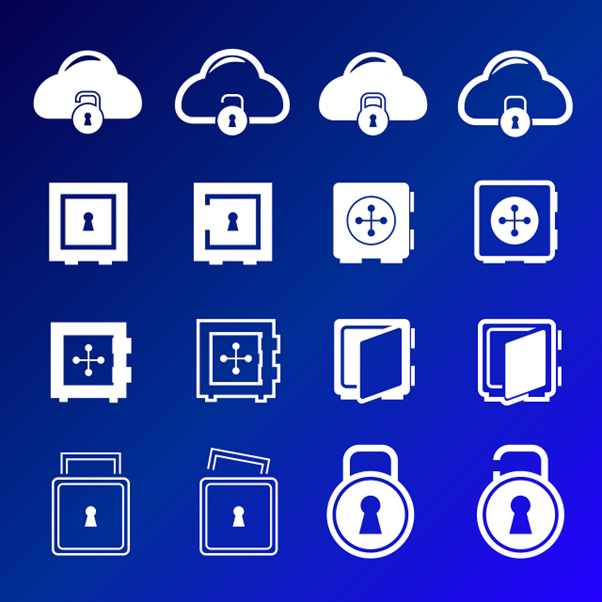
Cloud storage is an important tool in our modern digital world, for both personal and business use. As long as you have an internet connection, you can store and get to your info from anywhere at any time. While cloud storage is convenient, there is also a chance that your data could be stolen or accessed by people who aren't supposed to.
It's up to you or your IT support provider to make sure that your cloud data is safe.
How does cloud storage work?
This is a method of digital data storage where you store files and data on remote servers managed by a third-party provider, rather than on your local network or devices. Users can view their files from any internet-connected device with this service, which makes it very easy to collaborate in real-time and keep track of data. Based on how much room is needed, cloud storage companies usually offer different plans, ranging from free to paid.
First, You need to sign up for an account with a service to use cloud storage, then upload your files to their servers, and then use the internet to view and work with those files. Most providers have easy-to-use interfaces that make it simple to handle your files. These interfaces include features like sharing files and keeping them in sync across devices.
There are many benefits to cloud storage beyond being just a place to store data: to an extent, it also protects that data so that only allowed users can access it. In this situation, the idea of safe cloud storage is very important, as it means picking a company with strong cybersecurity measures and adding your own extra protections for your data.
Due to the fact that it’s flexible, cheap, and can easily be scaled up or down, cloud storage is getting more and more common. You can store a lot of data without having to buy and use physical storage devices, which can be pricey and take up a lot of room.
Cloud storage also makes it easier for people to work together. It's handy for users to share files with each other, which makes it perfect for team projects and working from home. Since cloud storage is always changing, it's important to know about the newest security methods and tools. This means knowing how to secure data, control who can see it, and back it up.
How to choose the right cloud provider?
This is a critical step in ensuring the safety of your data. Choosing the right cloud storage provider is paramount. A secure provider should offer robust encryption, reliable data backup, and strict access controls. When evaluating providers, consider factors such as their reputation, security features, and compliance with data protection regulations.
Look for These Key Features in a Provider:
Access Controls: Look for providers that offer strong access controls like two-factor authentication (2FA) and granular permissions. This limit who can access your files.
Encryption: Do NOT choose a provider that fails to use end-to-end encryption, which ensures that your data is encrypted both in transit and at rest. This means that even the provider cannot access your data without your encryption key, and if any hacker manages to steal your data, they can’t read it.
Backups: Choose a provider that offers regular backups of your data to prevent loss in case of technical issues or cyberattacks.
Compliance: Your chosen provider must be in compliance with major data protection regulations like the California Consumer Privacy Act (CCPA) or HIPAA for medical companies.
Customer Support: This is a ‘make or break’ issue for any industry. Good customer support is essential when you encounter any issues or have questions about security features.
It's also important to read reviews and ask about their security practices directly, which can give you a clearer understanding of their commitment to data security.
How to make the cloud more secure?
Improving on the existing cloud storage defenses involves implementing additional measures beyond what your provider offers. This is usually best left to professional IT services, but start by using strong passwords, enabling two-factor authentication (2FA), and regularly updating your software are crucial steps. Here are some strategies to further secure your cloud storage:
Create Strong Passwords and Bolster Authentication
- Strong Passwords: Create complex passwords that include a mix of uppercase and lowercase letters, numbers, and special characters. Avoid using easily guessable information like your name or birthdate. Check out our tips HERE.
- 2FA (Two-Factor Authentication): 2FA is a wise move whenever possible. This adds an extra layer of security by requiring a second form of verification, such as a code sent to your phone or a biometric scan.
- Use a Password Manager: This makes juggling too many complex passwords a snap. A password manager can also generate and store unique, complex passwords for each of your accounts. Logging in gets a lot easier.
Regularly Monitor Activity and Update Software
- Activity Monitoring: Check your account activity on a regular basis to detect any unauthorized access. Most providers offer logs of recent activity that you can review.
- Software Updates: This should go without saying: keep your operating system, browser, and other software up to date. Updates often include security patches that protect against known vulnerabilities.
- Data Encryption: You should encrypt your data locally before uploading it to the cloud. This adds an extra layer of protection in case the provider's encryption is compromised.
If you implement these measures, you can significantly reduce the risk of data breaches and unauthorized access.
What is the future of cloud storage?
Exciting new things in cloud storage are on their way, with advancements in technology expected to enhance both cybersecurity and functionality. Emerging trends include the use of artificial intelligence (AI) for data management and the adoption of hybrid cloud models. These developments will likely improve data security, efficiency, and accessibility.
The evolution of cloud storage incorporates more sophisticated technologies, such as AI and machine learning, to automate data management tasks and improve security. For example, AI can help detect anomalies in data access patterns, potentially identifying and preventing cyberattacks.
Also gaining in popularity are hybrid cloud models, which combine public and private cloud services. These models offer greater flexibility and control over data, allowing businesses to store sensitive data in private clouds while using public clouds for less sensitive information.
Cloud storage continues to evolve, so it's essential to stay informed about these developments and how they can enhance your data security and management capabilities.
How to start using cloud storage?
Cloud storage is like creating a bucket, then putting things (data) into it. Staying safe requires a combination of choosing a secure provider, implementing robust security measures, and staying informed about emerging trends. By understanding the key features of secure cloud storage and taking proactive steps to protect your data, you can enjoy the benefits of cloud storage while minimizing risks.
Consider the following steps for the best protection:
- Choose a reputable provider with robust cybersecurity features.
- Add your own security measures like strong passwords and two-factor authentication.
- Maintain regular updates on the latest security practices and technologies.
If you need guidance on securing your cloud storage or have questions about implementing these strategies, feel free to contact us. We are here to help you navigate the world of cloud security and ensure your data is protected.
Frequently Asked Questions
Which cloud storage is best for free?
MEGA and Google Drive are strong contenders for the best free cloud storage, offering 20GB and 15GB respectively. MEGA stands out with its generous free storage and end-to-end encryption. Google Drive excels with its seamless integration with Google's ecosystem and user-friendly interface.
How much does Google cloud storage cost?
It all depends on what you specifically need. Google provides its own handy guide:
First, check out the different types of storage.
Find what you need and head into Pricing.
What is the difference between MFA and 2FA?
It's a matter of how many layers. MFA (multi-factor authentication) is the overarching security framework that requires two or more forms of proof of identity, while 2FA (two-factor authentication) is a specific, more limited type of MFA that requires exactly two factors. Therefore, all 2FA is a form of MFA, but not all MFA is 2FA because MFA can involve three or more factors.
What is a bad password?
The world’s most common is also the worst, meaning the easiest for hackers to crack: ‘123456.’ If you are using this password, stop now. As stated above, check out our tips for strong passwords HERE.
How secure is your network?
As a reputable member of the IT Support Los Angeles community since 2002, IT Support LA offers a FREE, no-risk network and cybersecurity assessment. It is a non-intrusive scan that allows us to deliver a comprehensive report that is yours to keep. No strings, and no obligation to ever use our Managed IT Services.
The best defenses are expert cybersecurity to protect your data from theft, and a top-notch Managed Services Provider (MSP) to ensure continued reliability and defenses against newly emerging threats.
With our 100% Money Back Guarantee in writing, we offer a risk-free way for prospective clients to try us out. Because we do not require a ‘hard’ contract, our clients can fire us at any time with 30 days’ notice. We have to be good.
Among the Managed IT services we provide:
IT HelpDesk Service
Onsite IT Support
Cybersecurity
Cloud migration and management
Email migration services
Backup and disaster recovery
VoIP phone systems
IT disposition and recycling
Office moves
White label services (IT to IT)
IT Support LA is an award-winning Managed Services Provider (MSP):
o 3 Years awarded Best IT by the Small Business Expo
o Awarded 2nd best company of any type in the US by the Small Business Expo SB100
o Awarded Best IT Support in California by Channel Futures
o Winner of Best IT in Los Angeles by Channel Futures
o Listed as one of the world’s Top 501 MSPs by CRN and in the top 250 in the ‘Pioneer’ listing
o 4 years listed as one of the Top 501 MSPs in the World by Channel Futures
o Listed as #21 MSP in the World in Channel Futures NextGen 101
o Globee 2021 Bronze Award winner for Chief Technology Officer of the Year
o Globee 2022 Gold Award winner for Chief Technology Officer of the Year
o Named one of 2022’s 50 ‘Best’ businesses in California by UpCity
o Named Best of IT winner by UpCity
o Winner of Local Excellence Award for 2021, 2022 and 2023 by UpCity
o Named Best of Cloud Consulting winner by UpCity
o Certified as Top Managed Services Providers and Cybersecurity Pro by UpCity
o Named Best IT in Los Angeles by Expertise.com.
Take Action to Protect Your Data
Call IT Support LA if you're concerned about how your data is being used online. At our company, we specialize in helping businesses navigate the complex world of data privacy and cybersecurity. Whether you need guidance in implementing privacy policies or securing your online presence, we're here to help.
Contact us today to learn more about how you can protect your data and ensure a safer digital experience, and to receive your FREE no-risk network and cybersecurity assessment, just fill out the form on this page or call us at:
818-805-0909


